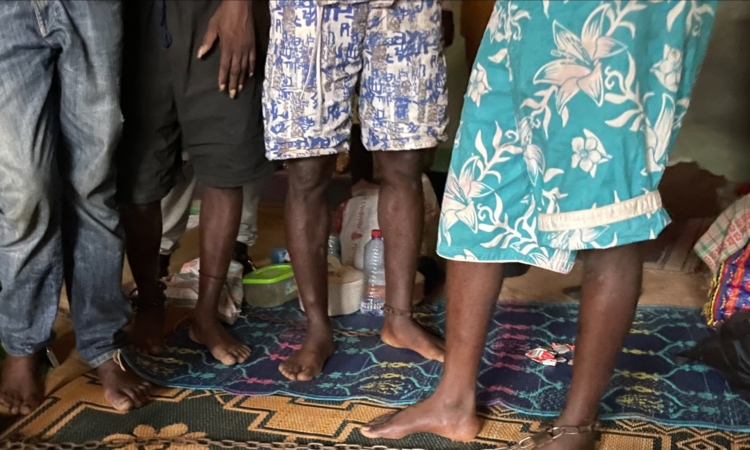
The global rights body says Ghanaian government has failed to ensure that people with psychosocial disabilities aren’t kept in inhumane conditions.
Ghana must take “immediate steps” to end the shackling and inhumane treatment of people with real or perceived mental health conditions, Human Rights Watch has said, a practice that continues despite legislation against it.
“Chaining people with psychosocial disabilities in prayer camps and healing centres is a form of torture,” Shantha Rau Barriga, the disability rights director at Human Rights Watch, said in a statement on Thursday.
The global rights body said that 10 years after the adoption of a Mental Health Act establishing that people with psychosocial disabilities should not be subjected to inhumane treatment, the government was not doing enough to ensure implementation.
Based on research the group has done since 2011, it found that families often take people with mental health conditions to faith-based or traditional healers because of widely held beliefs that psychosocial disabilities are caused by curses or evil spirits.
In previous reports, the group said shackled people often suffer from post-traumatic stress, malnutrition, infections, nerve damage, muscular atrophy and cardiovascular problems.
Between November 28 to 30, HRW researchers visited five prayer camps and traditional healing centres in the eastern and central regions of Ghana and interviewed more than 50 people, the group said.
In all the locations visited, people were chained or confined in small cages, “in some cases for more than seven months”.
HRW said the researchers found “more than 60 people chained or caged, including some children”.
At one herbal centre in Senya Beraku, 22 men were found closely detained in a dark, stifling room, all of them with chains, no longer than half a metre, around their ankles. “They are forced to urinate and defecate in a small bucket passed around the room. Despite the sweltering conditions, they are only allowed to bathe every two weeks,” HRW said.
“Please help us,” one man reportedly told the researchers, “we have a human right to freedom.”
The group said it witnessed serious human rights abuses in all locations visited, including a lack of adequate food, unsanitary conditions, lack of hygiene, lack of freedom of movement, and one case of repeated sexual violence.
“In all five camps, people were held against their will in what amounts to indefinite detention,” the group also said.
According to Ghana’s Mental Health Act (PDF), people with psychosocial disabilities “shall not be subjected to torture, cruelty, forced labour and any other inhuman treatment,” including shackling. Still, HRW’s Barriga said: “Despite Ghana’s ban on chaining, the government has failed to ensure that people with psychosocial disabilities no longer live under such inhumane conditions.”
Speaking to the AFP news agency, Tina Gifty Mensah, Ghana’s deputy minister of health, said the government was not happy about the practice of shackling and detaining people.
“Obviously, it’s an act the constitution of Ghana frowns upon and the government and other stakeholders have also done a lot by way of education to sensitise people about it,” Mensah told AFP.
“We’ll look at the Human Rights Watch report, and the appropriate agencies will do what must be done to address this development.”
Follow Al Jazeera English:







